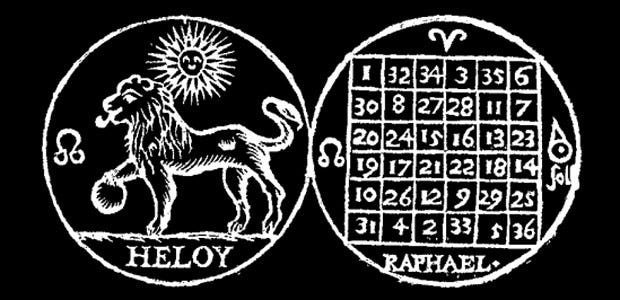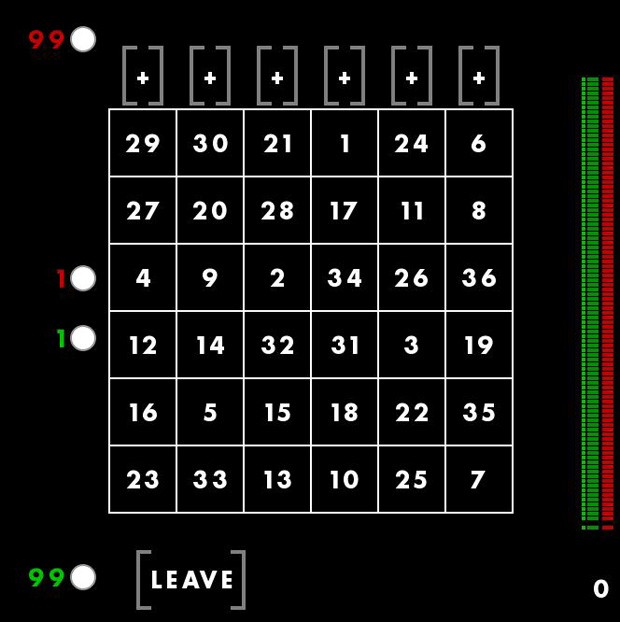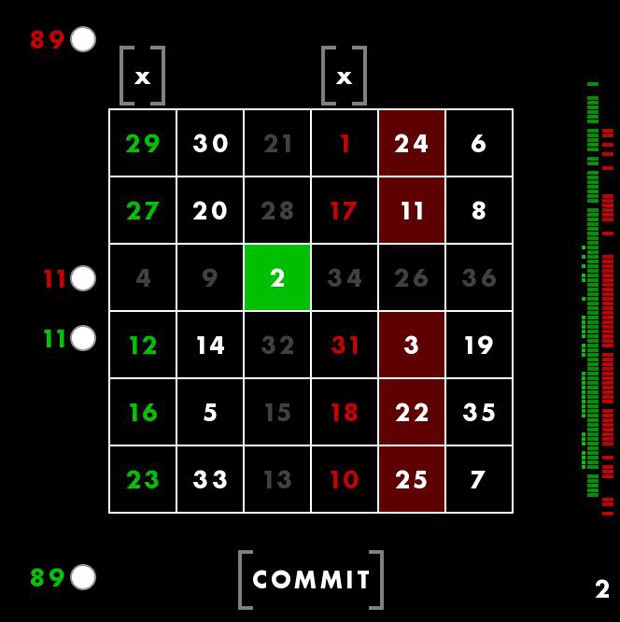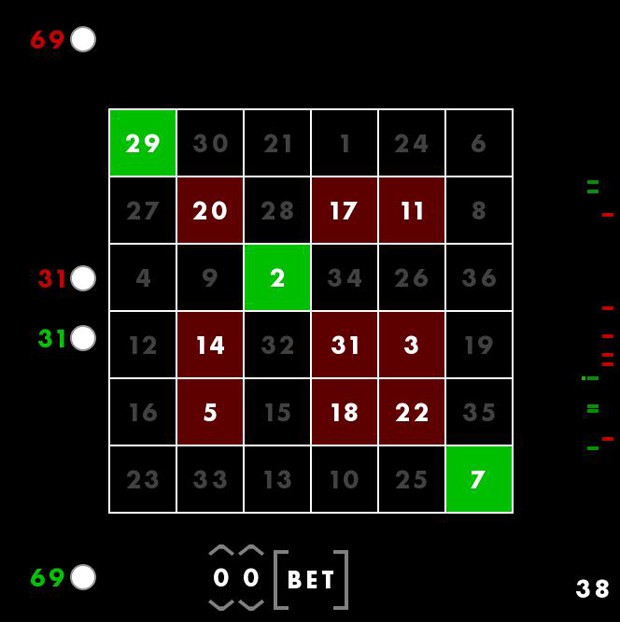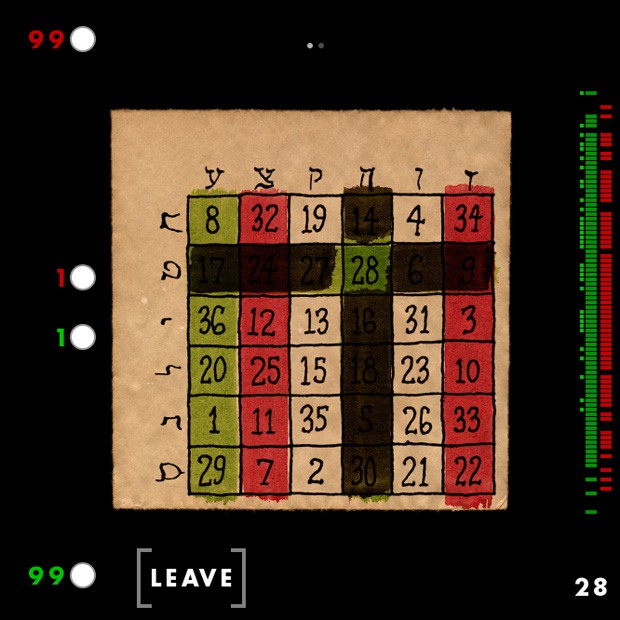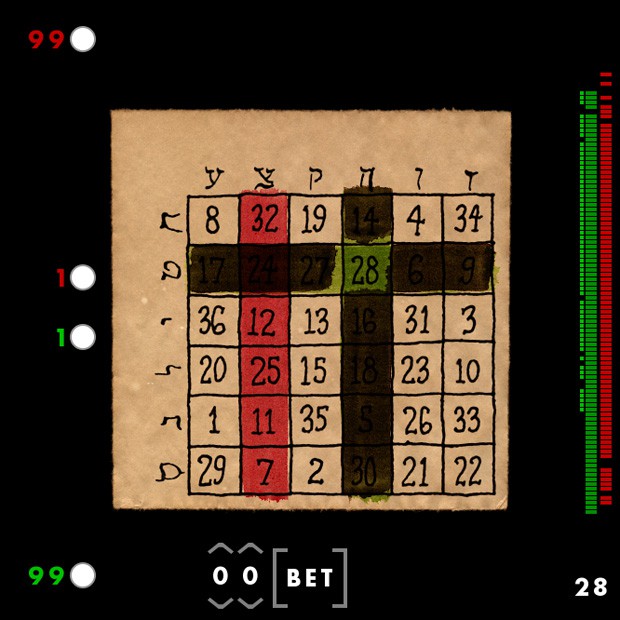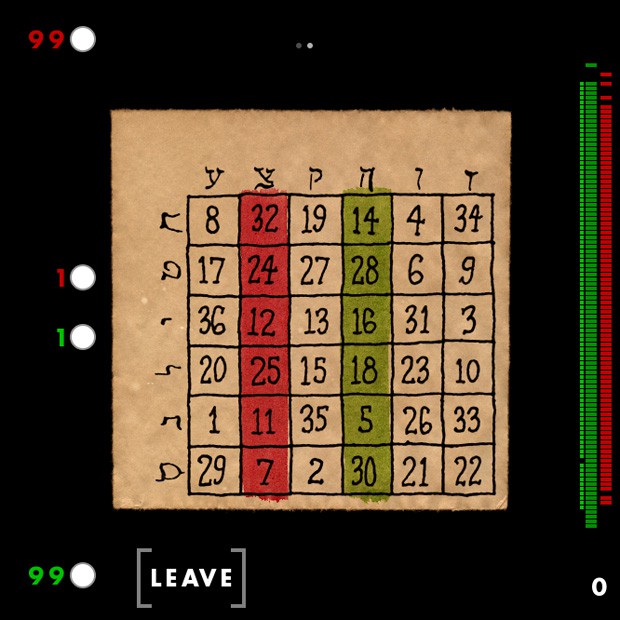Cordial Minuet: Hands On With Rohrer's Gambling Game
Playing for pennies
"The next step is where you take out your credit card," says Jason Rohrer.
We're on the phone for a Cordial Minuet preview session. Cordial Minuet is Rohrer's current game project – a gambling game based around magic squares into which I must deposit real money if I wish to play, even at this pre-alpha stage.
I deposit $5. I'll get back to the payment and security side later but for now, let's concentrate on how the game works.
When you log into your account you'll have the option to create a game with a particular buy-in or you can choose an existing game from the list. The lowest possible amount is one single penny but games can theoretically range all the way up to $999 million in terms of your buy-in. We settle for a penny game, because I'm a high roller.
Once you're in a game with an opponent you're given 100 units to bet with, each worth one hundredth of whatever amount you put in. When it's a penny game like this one that means you're playing for fractions of a cent and it's incredibly low risk without completely removing the real-money element which is an essential element for Rohrer.
In the centre of the screen is a six by six magic square featuring the numbers 1-36. In case you're not sure what a magic square is, it's just a grid of numbers where all of the columns and rows add up to the same number. A lot of people seem to have a panic reaction when it comes to maths so I'm going to say at this point that Rohrer shields players from pretty much all the calculation side of things so what you're left with is more about logic and reading your opponent's behaviour.
On your first turn you must pick a column of numbers for yourself and a column of numbers to assign to the other person. They're doing that too with the exact same magic square except what they're selecting is rows rather than columns.
When you're ready you hit the "commit" button to cement your choices. After both people have committed to the action your magic square updates. You can now see which row they picked for you and where it intersects with the column you chose for yourself. The number in that intersecting square is your score so far. What you don't get to see is what your opponent picked for themselves.
Then there's a betting cycle. You look at your score so far and the lines of numbers left on the board to see your remaining options. You also try to work out what your opponent might have done and how they could have scored. If that sounds complicated, there's actually a tool on the right hand side of the magic square to help you do this. What it does is it keeps track of all the possible final scores of your opponent based on the information you have to hand. Those are in red. Next to them, in green, you can see the information you've given them as well as your real possible final scores. It's really useful for giving you an idea of the spread of their options compared with yours.
By keeping an eye on this you don't have to do any calculating, but you can see how likely they are to end with a high or a low score and adjust your bet accordingly. You could also use this stage to play mind games, betting confidently to convince them of a strong starting score, or cautiously to pretend you're at the lower end.
You'll repeat those stages twice more to use up the remaining lines on the board and what you'll end up with is three intersections on the grid which give you your final score. The more you play, the more information is revealed to your opponent and the fewer red options remain on the possibility tracker.
At the end there's a final step. You must pick one of your three grid numbers to show your opponent. This has the effect of narrowing their possible final score to two options. In my first game with Rohrer he knew I either had a final score of 78 or 38. I knew he had 41 or 25. In that situation I could be sure I'd won if I had a 78 and Rohrer could be sure he had lost if he'd had a 25. With 41 or 38 the outcome would be uncertain and so you'd think back – how were they betting this match? If we'd played a few boards already we could have taken that into account too – were they cautious as players or were they confident? Did they prefer risky lines with very high but also very low numbers or did they gravitate towards the ones bristling with mid-value squares?
With the final bet placed there's the big reveal and winner is given the gambled chips. At that point you can stay in the match, trying to use your knowledge to gain more of those chips, or you can tap out and try your luck elsewhere.
Cordial Minuet is a lot simpler and more intuitive when you're playing than when you're reading a description of how it works so I ask Rohrer how he's going to go about teaching it to people. After all, existing gambling games like poker have the benefit of an existing cultural permeation. I might not know a straight from a flush without a rulesheet in front of me but the basic structure of poker is something I encountered at secondary school while playing card games at lunch and which repeatedly pops up in movies scenes, books, TV shows…
"This is a brand new game and doesn't have any cultural currency," admits Rohrer. "But within the game itself I'm going to assume people know how to play. There's not going to be a tutorial built in. There are going to be videos on YouTube that walk you through – me talking for five minutes and telling you how to play and what the graph on the side means."
Something I'm trying to figure out is whether Rohrer wants to build that cultural permeation and where the game fits into the online gambling game landscape. He hasn't been in touch with casinos or gambling sites to see whether they're interested in his game and he's not dressing it up in a traditionally casino-friendly aesthetic. The graphics here are placeholders but the finished game will have a magic square designed to look like an occult parchment (you can see this in the images further down). The whole thing has an independent, experimental framing I recognise from his other games.
"How do you feel you fit in?" I ask, referring to the online gambling space.
"I definitely feel funny about it and that funny-ness makes it interesting to me. I know gambling is handled differently legally around the world. In the case of the United States I've structured my game in a way that – because who wins is based on a player's skill and not a random element – it avoids running afoul of US anti-gambling legislation. Attitudes on gambling – probably because of legality – vary around the world. Although I don't know – maybe everyone has come to the conclusion that it's a bad thing which tends to destroy people's lives."
His last remark is hyperbole and delivered with humour but Rohrer is very much a libertarian – at least on this front. "I definitely believe in individual freedom and responsibility as well, though," he continues. "I've been able to gamble without letting it destroy my life so the idea that I should be prevented from doing that even though I can handle it… I've also been able to have the occasional drink in my life without becoming an alcoholic, or occasionally use certain drugs without becoming addicted to them and destroying my life, I've used fireworks without blowing my fingers off.
"I feel like we do need to let people be responsible for their own actions and there are people who play a game like poker and study it deeply and in a meaningful way. The idea we make that illegal seems strange to me. In terms of the moral aspect that individual responsibility comes to the fore again. I'm making this game because it's a really interesting space to explore, not because I'm hoping that the gambling itch will manipulate people into losing lots of money and giving me lots of profit."
But that is still a possibility.
"Right," says Rohrer. But he counters by mentioning his recent game The Castle Doctrine, an asynchronous multiplayer project which focused on themes of housebreaking and protecting your family. "It was gratifying as a developer to see so many [players] going that deep and discovering this cool stuff I didn't know existed but on the other hand I'm looking at how many hours people have devoted. I'm not their babysitter and if they weren't playing my game I couldn't control what they were doing otherwise so I don't know, I don't know how to handle that. I want to make a game like this but am I really responsible for the few people who are going to abuse it?"
The seed for the game is something Rohrer has been nursing since about 2007. "I had this idea that there's this hole in the law where you can make a game and play for money as long as it's skill based." That idea began to take on a more concrete form after he began playing poker more seriously and was intrigued by the emotional experience it offered. "A lot of people take an existing gambling game and put it on a computer or take a game like Bejeweled and build a tournament for money around it. I wanted to make a game where it's designed from the ground up for that space. A game where money was a mechanic like it is in poker.
"At the same time I didn't want it to be a game where the skill was somehow perceived as being hard to acquire – I feel chess and Go have a skill that's so out of reach for almost everybody that most people give up right away. The gap between an [expert] and a beginner is so huge they can't play together."
The specific form for Cordial Minuet came as Rohrer was fiddling with ways players could pick options on a grid simultaneously in order to affect one another. The question then became "How do you make that grid fair?" A magic square fit the bill because its defining characteristic is that the rows and columns add up to the same thing.
"I stumbled onto the six by six [square] just testing it and realised that the numbers 1 through 36 sum to 666." He adds, "Once I looked into the history of magic squares I realised this has something to do with the origin of 666 and is used for numerology purposes and occult practices. It seemed perfect and it worked perfectly in the game. Actually, the occult framing relates to why the game is called Cordial Minuet in the first place – it's an anagram of "demonic ritual".
Given it's a game of skill and given the game already contains a bot capable of calculating all the possible outcomes of the game (that red and green tracker on the right hand side) I ask Rohrer whether he's concerned it's a solvable problem, or at least that you could build an AI capable of playing, if not optimally, then at least with a degree more probability of success.
"I've applied standard game theory to it and run all sorts of sims in terms of building different artificial intelligence agents to test different ways of playing to check there's no degenerate way of playing that would make the game less interesting," he says. "It doesn't have a clear-cut, pure solution."
I also said I'd get back to the money side of things, so here goes. When you start an account you'll be asked to add funds so you can play. In terms of security, Rohrer tells me "The credit card number is sent from the client to my server with state-of the art encryption. It's way better encryption than what most websites are using to handle your credit card. After that - using all the security that's required – I send it off to the processing company and then I discard the credit card number. I don't hold onto that at all. There's no credit card numbers on my server."
The processing service charges a fee which is taken out of the amount you deposit. I put in $5 and the charge was 45 cents. Rohrer was initially going to try and swallow that himself but if a lot of money gets deposited and then withdrawn that could potentially leave him footing a large bill and with nothing to show for it so he decided against it. If you end up winning big or would like to take the money back out you'll need to pay a further charge to a cheque provision company who will mail you your winnings minus that fee. For the US and UK it's $3. Rohrer likes the idea of a digital game sending you a physical object.
But given my initial lowly investment of $5, the idea of only being left with $1.55 if I break even and leave immediately smarts. I ask whether he thinks starting the game at a loss will affect players. "If you look at the way poker rooms handle this they do take a fee and cover themselves," he says. The difference is that "on top of that they usually give you some bonus for signing up – 'We know you're going to lose your money anyway so here's some free money to play with!' I want to avoid that creepy incentivising sort of thing. The game is already creepy enough."
That doesn't actually make me feel much better about the fees and I can't imagine actually withdrawing funds unless I manage a relatively big win – like $3.45 big, for example. Like I say – I'm a high roller. For actual high rollers there are other admin processes which crop up. If you try to withdraw $600 or more US tax laws mean you'll need to send some tax documentation, and if you want to deposit thousands of dollars you'll need to be able to provide proof of identity.
There's also the fact that every ten percent of each prize pot goes to Rohrer. You could leap straight to imagining large sums of money with that – "Rohrer's going to be rich!" you might think. But bear in mind that he seems to see the money more as a catalyst for getting people to care about the outcome of the games in a particular way. That's why the lowest buy-in for a game is a penny rather than a dollar. In those matches he'll be making hundredths of a cent as his rake.
I actually ask him a few games in how much money he's made so far. He tells me that around 30 people have deposited a total of $120 but that's not his money, that's what's in their accounts. He doesn't give me an exact figure overall but from our games he's made a fifth of a cent. His biggest profit, he tells me, was from playing a Forbes journalist. He made 8 whole cents.
Cordial Minuet will be heading to private alpha shortly.
